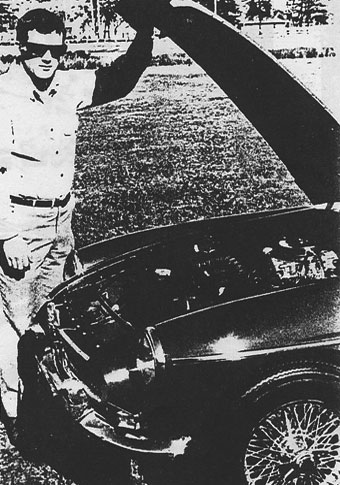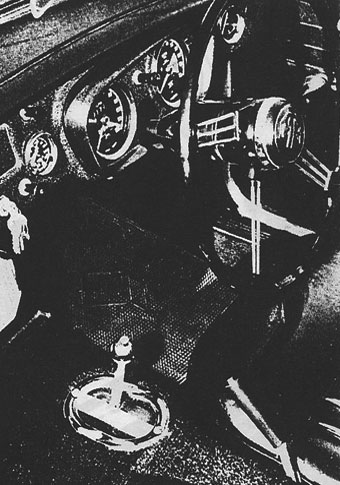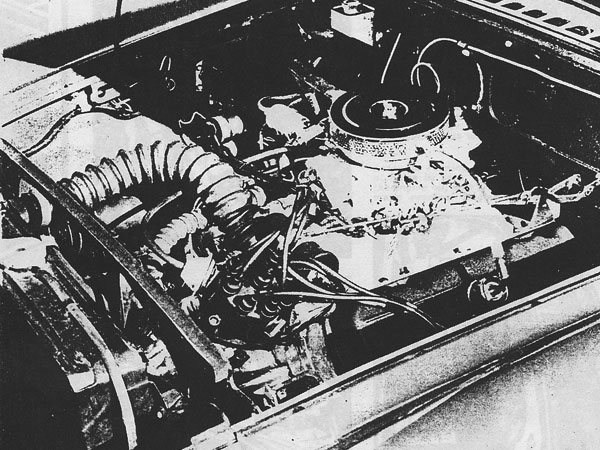
For go-manship, not show-manship, would you believe an...
MGB Buick?
Disguise exercise: hide one 218 cube alloy Buick V8 (don't sneer, the Repco mills started from here) under the bonnet of an MGB with no body mods and a single exhaust outlet. Change the final drive. Now climb in and hose off everybody. Understeer on corners? You must be joking, sir: this mill is more than 50 lb. lighter than the original!
as published in BritishV8 Magazine, Volume XVI Issue 2, October 2008
Re-printed unedited by exclusive written permission of "Sports Car World".
This article originally appeared in their issue for November 1967.
by Al Lauder
IMAGINE yourself whistling along the highway in something like a Falcon GT.
You're sitting pretty close to the speed limit, restraining the beast under
your right foot, drinking in the luxurious feeling of having power on tap
whenever you need it. Of course, you bought the car for the status symbol
of the whole thing. The big look with big power.
You flick a glance in the rear vision mirror and note a dark green MGB in
the distance. Although quite unconsciously, your top lip begins to curl, your
eyelids droop a fraction - and you settle into your seat a little more. Ho hum,
it feels sweet to know the Bee is going to follow your tail lights for the next
umpteen miles.
Suddenly, there's a raspy horn note behind you. Another glance in the mirror.
Dammit, doesn't that cloth-capped nit recognize the color of the car? Can't he
read the GT insignia on the tail? And still he acts like a pompous bastard and
wants to get by.
The low-slung car whips past like you were standing still, a green blur slipping
by the window with a most unusual exhaust note. Your brow wrinkles. The lip curl
turns into a sneer. Your right foot heads a little further for the floor. No
impression. The green "thing" becomes smaller before your eves. And smaller,
and... gone!
Unreal. You search your mind for something you may have noticed as it passed
you. Nope. Same height. Sure, it had fat wheels, but so do a lot of MGs you've
seen lately. No bubble in the hood, no straps holding the bonnet shut like
boy-racers do. So, what's all the noise about?
That's it. The noise. That burbling sound. He must have been going 15mph
faster, yet he burbled along. Nothing like the normal Bee sound at all.
Something smells, Sherlock!
 Mark Keeley, high performance American car importer, proudly lifts the bonnet of his latest toy. The car is most tractable in traffic and an enthusiasts delight on the open road. |
 The finished job defies detection completely. Apart from the enthusiastic MGB fan, we'd defy anyone to pick the fact that this car has an alloy V8 nestling under the hood. |
The sports car in question is owned by Mark Keelev of Balgowlah Heights,
Sydney. Being an importer of fine, high-powered American machinery, Mark
naturally caught the V8 bug in a big way. He had this MGB sitting around
home doing hack service to the shops each day and down to the club on Saturdays.
Next thing he knew, he had a spare 1962, 3524 cc alloy Oldsmobile engine
coupled to an automatic gearbox, which had set him back $800. This incidentally
is the same 218 cu in. alloy Buick on which the first Repco V8 mills were based.
As his wife liked the B anyway, and the summer was coming on (a soft top does
wonders for the wife's morale on Sunday afternoons), Mark found himself idly
measuring the length of the Olds and the length of the B block. He soon
discovered if the B engine and gearbox were removed, there'd be a pretty
sizeable hole up front, which just happened to be big enough for the Olds engine.
The clincher came when a friend just happened to be looking for a little-used
1967 MGB engine and transmission. So, $540 later, Mark was looking into the
hole where the B engine had been.
With the easv part over, the B was without power and the Olds was almost
rattling its tappets to be got off he garage floor and into that vacant
space. Mark measured again to make sure he hadn't dreamed the whole thing,
that the Olds would actually fit into a compartment that was looking smaller
every time he turned around, and decided he might as well try the lightweight
V8 as sit around waiting for miracles to happen.
Enjoying this article? Our magazine is funded through the generous support of readers like you!
To contribute to our operating budget, please click here and follow the instructions.
(Suggested contribution is twenty bucks per year. Feel free to give more!)
Technical reference showed the Olds (complete) to weigh 320 lb as against
358 lb for the original power plant, so there was little problem concerning
weight. However, the V8 required more cooling, overcome by grafting extra
core-width to the stock MGB radiator.
The engine transplant was easier than expected. The only clearance problems
were the firewall and the inside of the wheel arch. This was alleviated by
cutting a section back into the firewall to allow room for the larger bell-housing,
and notching the inside of the mudguards to clear the exhaust headers.
The engine mounts were fabricated from sheet metal, while the gearbox rested
on the original mount after slight modifications. The driveshaft was shortened
to suit. The exhaust pipes from each bank of the Olds V8 meet on one side
between the engine and gearbox, then run into a stock MGB muffler and tail
pipe.

The alloy Olds engine looks like it was made for the MGB engine compartment. Its height is similar
to that of the original engine, and modifications to panels were minor. The inside panels of the
mudguards were notched to clear the exhaust headers on each side of the car. This panel work,
along with slight modifications to the firewall, were the only alterations to the body.
The front oil cooler originally used for the engine oil, now does sterling
service for the three-speed Hvdramatic gearbox, as the engine oil runs at
normal temperature without this extra cooling.
The floor shift for the automatic gearbox is in almost the same place as the
former lever was, although the floor was reshaped to suit. As the mats had
been chopped up during alterations, new carpeting was fashioned for the whole
interior.
On the road, the car is a genuine flyer. The mechanicals are quiet and smooth,
much more so than the original MGB unit. Normal MGB rear end gearing gives a
top speed of around 90 mph; however, proper gearing to use all of the available
torque of the Olds V8 produces a flat 120 mph top speed.
Although most V8 engines are known to be fuel guzzlers, Mark has experienced
a steady 20 mpg without even thinking of trying for fuel economy. The
four-barrel Holley carburetor, while not the most economical in the world,
provides the potent unit with ample food while giving reasonable economy in
return for such an increase in power.
To look at the car, there's virtually no difference from stock. The front
wheel arch is a little higher than normal, but that's all. The wire wheels
have proved strong enough to handle the extra power, while the disc brakes
haven't faltered once.
The engine sits no higher (to the top of the carburetor) than the MGB unit
did, so there was no need for air scoops or hood bubbles normally found on
conversions of this type.
So, the next time you're wanting extra power and torque from your car, think
about a transplant before you go buying a heap of bolt-on goodies. You'll
near as dammit pay the same price for the finished job - and have a reliable
and uncomplicated motor car.
BritishV8 Magazine has assembled the largest, most authoritative collection of MG "MGB GT V8" information you'll find anywhere. Check it out! Access our MGB GT V8 article index by clicking here.

